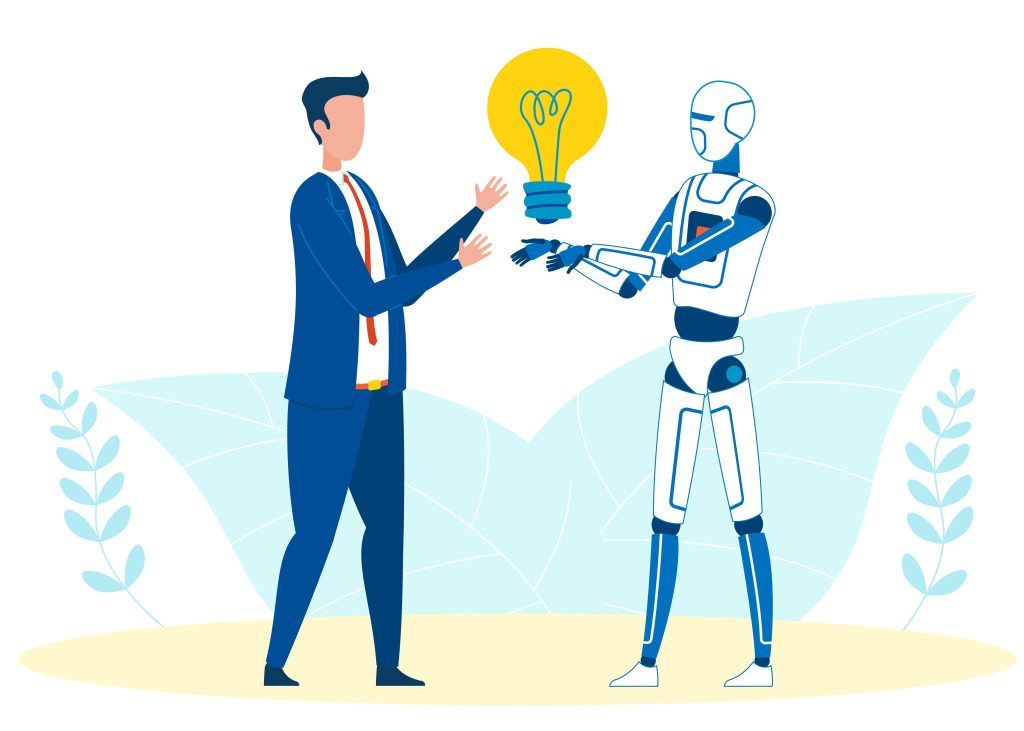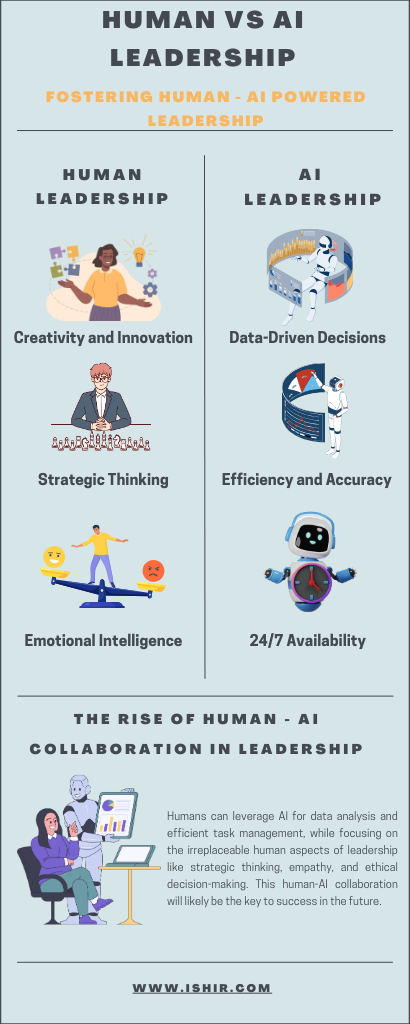The artificial intelligence (AI) revolution is upon us, transforming every facet of our lives, and the workplace is no exception. A recent study by McKinsey & Company found that 80% of executives believe AI will significantly change how their companies operate. But with this change comes a crucial question: how will leaders navigate this new landscape?
Here’s the truth: AI isn’t here to replace leaders. It presents a tremendous opportunity to augment human capabilities and propel organizations to new heights. However, the skills required for successful leadership in the age of AI are evolving.
We will explore the specific skill sets that will empower you to make informed decisions, foster human-machine collaboration, and remain at the forefront of innovation.

The Core Skills of Human Leadership and the role AI in it
1. Strategic Vision & Decision-Making:
Human Strength: Leaders with vision can set the course for the organization, considering long-term goals and market trends. They leverage their experience and intuition to make sound decisions, even in uncertain situations.
AI’s Role: AI can assist by analyzing vast amounts of data to identify opportunities, predict future trends, and highlight potential risks. This empowers leaders to make more informed strategic decisions aligned with the organization’s vision.
2. Emotional Intelligence & Communication:
Human Strength: Leaders with high emotional intelligence (EQ) can build trust with teams, inspire motivation, and foster collaboration. Effective communication is crucial for clear direction setting and navigating interpersonal challenges.
AI’s Role: While AI can’t replicate human empathy, it can analyze team sentiment and communication patterns, offering insights for leaders to understand their people better. AI can also assist in communication tasks, such as personalized employee feedback or generating clear reports.
3. Adaptability & Innovation:
Human Strength: Adaptable leaders can navigate change effectively and embrace innovation & emerging technologies. The ability to think outside the box fosters a culture of continuous improvement.
AI’s Role: AI can be a powerful tool for innovation. It can analyze data patterns to identify new market opportunities or suggest creative solutions to problems. Additionally, AI can automate mundane tasks, freeing up leaders’ time to focus on strategic innovation.
4. Ethical Leadership & Human-Centered Approach:
Human Strength: Ethical leaders prioritize fairness, transparency, and the well-being of their teams. They understand the human impact of decisions and strive to create a positive work environment.
AI’s Role: Here, human oversight is crucial. Leaders must ensure AI algorithms are unbiased and avoid perpetuating discrimination. Additionally, leaders need to balance automation with human interaction, ensuring AI doesn’t replace the value of human connection within the organization.
Challenges and risks involved in a leadership role with the integration of AI
Here are some key challenges and risks of leadership with AI integration:
1. Ethical Considerations:
AI algorithms can inherit biases from the data they’re trained on, leading to discriminatory decision-making. Leaders must establish ethical guidelines for AI use and ensure transparency in decision-making.
2. Data Privacy and Security:
AI relies heavily on data, raising privacy concerns. Leaders need robust data protection measures, such as secure storage, encryption, and access controls, to comply with data privacy regulations.
3. Workforce Transformation:
AI automation may displace jobs. Leaders must plan for workforce reskilling and upskilling to prepare employees for new roles alongside AI.
4. Adapting to Technological Disruption:
The rapid pace of AI for software development company can be overwhelming. Leaders need to be adaptable and embrace continuous learning to stay ahead of the curve.

Wrapping Up
The age of AI is upon us, and it’s fundamentally changing the landscape of leadership. While AI offers immense potential, navigating this new landscape requires a shift in leadership style. Remember, AI is a tool, and like any powerful tool, it requires human direction and oversight. Leaders who embrace continuous learning, prioritize human connection, and foster a culture of innovation will be the ones to thrive in the age of AI. The future of leadership is not about being replaced by machines, but about collaborating with them to create a more efficient, innovative, and ultimately, human-centered future.
About ISHIR:
ISHIR is a Dallas Fort Worth, Texas based AI-Native System Integrator and Digital Product Innovation Studio. ISHIR serves ambitious businesses across Texas through regional teams in Austin, Houston, and San Antonio, supported by an offshore delivery center in New Delhi and Noida, India, along with Global Capability Centers (GCC) across Asia including India (NOIDA), Nepal, Pakistan, Philippines, Sri Lanka, Vietnam, and UAE (Abu Dhabi, Dubai), Eastern Europe including Estonia, Kosovo, Latvia, Lithuania, Montenegro, Romania, and Ukraine, and LATAM including Argentina, Brazil, Chile, Colombia, Costa Rica, Mexico, and Peru.
Get Started
Fill out the form below and we'll get back to you shortly.





